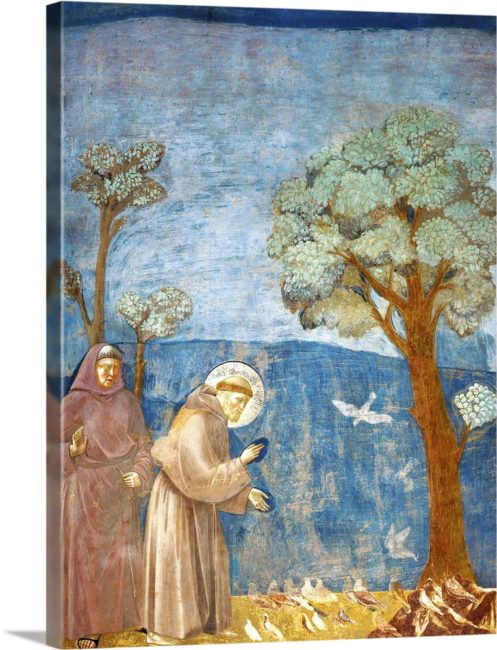
This coming Tuesday is the feast day of St. Francis of Assisi, one of the best-known and most-loved of the church’s myriad medieval saints. St. Francis is best known for two things: his commitment to strict poverty in the service of the gospel, and his distinctive recognition of non-human animals as creatures of God whose lives are no less worship-filled than ours.
Francis is famous for preaching to the birds. I find it more interesting to hear of him praying with them:
…When he was walking with a certain Brother through the Venetian marshes, he chanced on a great host of birds that were sitting and singing among the bushes. Seeing them, he said unto his companion: “Our sisters the birds are praising their Creator, let us too go among them and sing unto the Lord praises and the canonical Hours.”
The Life of St. Francis, by St. Bonaventure.
The same goes for the cicadas, whose voices once inspired blessed Francis to prayer:
At Saint Mary of the Little Portion, hard by the cell of the man of God, a cicada sat on a fig-tree and chirped; and right often by her song she stirred up unto the divine praises the servant of the Lord, who had learnt to marvel at the glorious handiwork of the Creator even as seen in little things. One day he called her, and she, as though divinely taught, lighted upon his hand. When he said unto her: “Sing, my sister cicada, and praise the Lord thy Creator with thy glad lay,” she obeyed forthwith, and began to chirp, nor did she cease until, at the Father’s bidding, she flew back unto her own place.
This Sunday we’ll once more hold our annual-but-for-Covid “Blessing of the Animals” (Sunday, October 2 at 12pm at the Training Field in Charlestown), a short service of prayer and blessing for animals and the humans who love them, usually timed around St. Francis day in his honor. It’s a beautiful service recognizing and honoring the bonds of love between people and pets; I invite you to bring yours!
But if you, like me, don’t have a pet—if you, like me, are in fact quite allergic to most of the cuddliest household animals, and were left with the limited affections of two short-lived hamsters and two easily-started turtles during your childhood—St. Francis’s example is perhaps even more relevant. It was in the song of nature, after all, that Francis heard creation’s prayer to God. It was not only in the bark of a beloved dog or the meow of a contented cat that Francis heard an animal’s love for its human. It was in the songs of the birds and the bugs that he heard their love for God, and was himself inspired to sing God’s praise.
“Of all the saints,” writes our official hagiography, “Francis is perhaps the most popular and admired but probably the least imitated; few have attained to his total identification with the poverty and suffering of Christ.” Fair enough; we are often more enamored with the idea of Francis than with the actual, difficult life of Francis. But while we may not imitate his poverty, we can at least imitate his inspiration. We can allow ourselves to be inspired by the voices of the creatures all around us. We can listen to the sweet hymns of the birds. We can let cicadas lead us into song, and thank God for the gift of this beautiful creation.